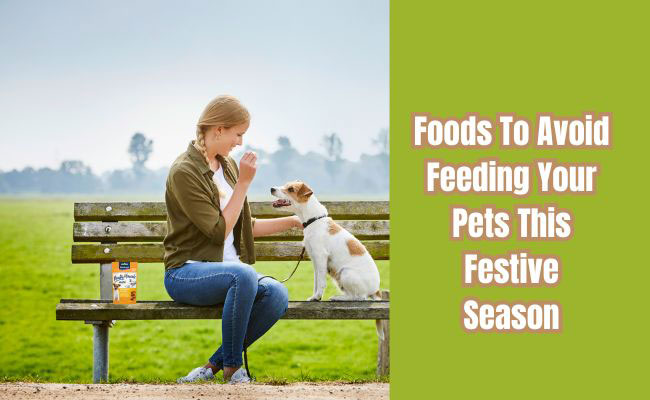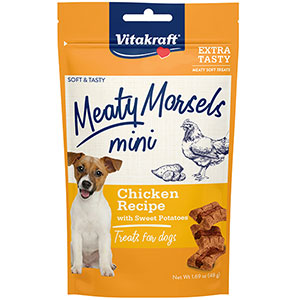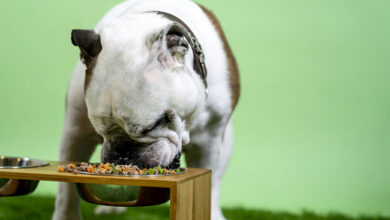
Whether you prefer wrapping your dog’s presents, dressing them up in a charming holiday bow tie, or cooking their own Christmas supper, if your four-legged buddy is having a nice time, it can truly make the festive period seem even more magical.
But, as we settle down to our delectable turkey dinners and luscious sweets, it’s vital to remember that not every Christmas goodie is intended for our pets. There are a few holiday delicacies that you should not share with your dog, no matter how hungry they are.
Here is a list of holiday meals that should not be fed to pets.
Skin and bones
While it is acceptable to offer your dog limited amounts of leftover turkey, it is critical to keep your dog away from the bird’s skin and bones. Turkey’s skin is far too fatty for your dog, and consuming greasy meals like this can cause pancreatic difficulties and obesity, particularly in smaller dogs.
Not only that, but meat bones are a possible choking threat for your dog and can cause internal organ damage since they are difficult to digest.
Bones lose moisture and become brittle as they cook. You might think that giving your dog a bone is normal, however, all cooked bones should be avoided. Splintered bones might become caught in your pet’s throat or digestive tract, causing severe harm. We recommend that you consult with an expert about which raw bones are suitable for your dogs.
Chocolate
Chocolate, as you are surely aware, is extremely harmful to dogs since they are biologically incapable of metabolizing it. Even though this is a well-known fact, it remains one of the most common causes of dog poisoning.
Chocolate may cause your dog’s heart rate to elevate, as well as undesirable stress on your beloved friend’s kidneys and neurological system.
If your dog consumes even a tiny bit of chocolate, you should schedule an emergency visit with your veterinarian and constantly watch their behavior for any signs of sickness.
Garlic, onions, leeks, or shallots
While onions, garlic, shallots, and leeks are delicious on Christmas, they all belong to the allium plant family, which is toxic to dogs. Onions and garlic contain a chemical substance called thiosulfate, which can be toxic to dogs because it damages their red blood cells and leads them to be anemic.
Even if they only eat a tiny amount, it might induce stomach distress. There is considerable disagreement over the amount of garlic that should be included in your pet’s food. Please contact a vet if you are unsure or have any queries.
Long-forgotten Leftovers
We all know how much our dogs like sniffing up discarded crumbs days after Christmas. However, if food is left out for an extended period, it may become a breeding ground for mold and bacteria, with bread, meat, and dairy items being particularly vulnerable.
If you choose to store any leftovers, keep them out of reach of your pet and no longer than 24 hours or the time specified on the product’s packaging.
Nuts
Nuts are a beloved holiday treat, but because many of them are fatty, they may be exceedingly dangerous to your dog. Even little quantities can cause your dog to have diarrhea, vomiting, and weakness in their rear legs, and in the worst-case scenario, pancreatitis.
If your dog has eaten a high amount of nuts and is exhibiting symptoms, you should seek veterinarian care as soon as possible.
Alcohol
While you may not be giving your dog alcohol, beverages are frequently left unattended at social occasions. Holiday drinks are often sugary, and curious pets may try drinking your eggnog.
In addition, holiday foods frequently contain alcohol. Don’t forget about the rum-soaked fruitcake.
Grapes or raisins
While chocolate and alcohol may come as no surprise, raisins and grapes aren’t always known to be hazardous to your pets. They have the potential to induce renal failure in dogs.
Vomiting and hyperactivity are the first indicators of poisoning. Keep any sweets, fruitcakes, and fruit baskets out of your pet’s reach at all times. If you believe your pet has eaten grapes or raisins, contact your veterinarian right away.
Milk products
We all recognize the image of a lovely cat drinking from a saucer of milk. Unfortunately, it isn’t all that adorable. Because dogs and cats aren’t made like humans to process lactose, intake might cause digestive problems. This applies to all dairy products. Most of the time, this will result in severe digestive distress.
Now that you know what not to give your dogs this holiday season here are some yummy treats your pets will enjoy.
Create holiday happiness with Vitakraft, the prestigious multinational pet food and treat brand that has been warming the hearts of dogs and their owners for over 180 years. Vitakraft is celebrating the beautiful bond between family and pets this holiday season with tasty holiday gifts for those cherished friends, including delicacies suited to the individual preferences and demands of each pet.

Vitakraft is the perfect holiday gift or stocking stuffer for everyone, from the active cat and devoted dog to the tiniest hamster and chirpiest of birds.
A few treats for your dog include;
Meaty Morsels Dog Treats: Meaty Morsels are the juicy and meaty treats of your pup’s fantasies. These snacks are made with more than 70% beef and carefully cooked to make them incredibly soft. Because of the extra-soft texture, dogs of all ages may easily chew this treat.
Meaty Morsels can also be used as a pill pocket. They make excellent training rewards when broken down! Meaty Morsels is the appropriate reward for medium dogs, while Meaty Morsels Mini is suited for small dogs.
Vitakraft Chicken Treats for Dogs are the best nutritious dog treats. For longer-lasting, extra meaty treats, these hide-free dog chews are manufactured with 87% chicken. The treats are juicy and meaty, making them the ideal chew for dogs of all sizes. These treats are individually portioned for freshness and convenience, so you can give them to your pet wherever and whenever he wants them!



